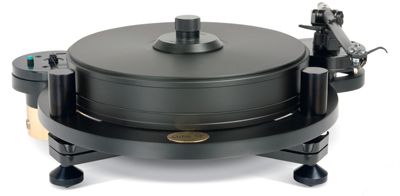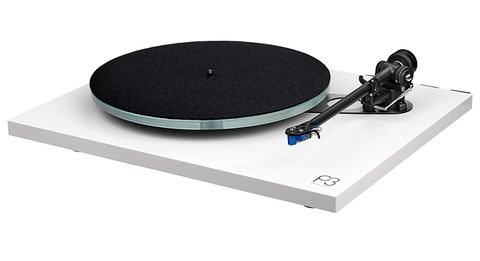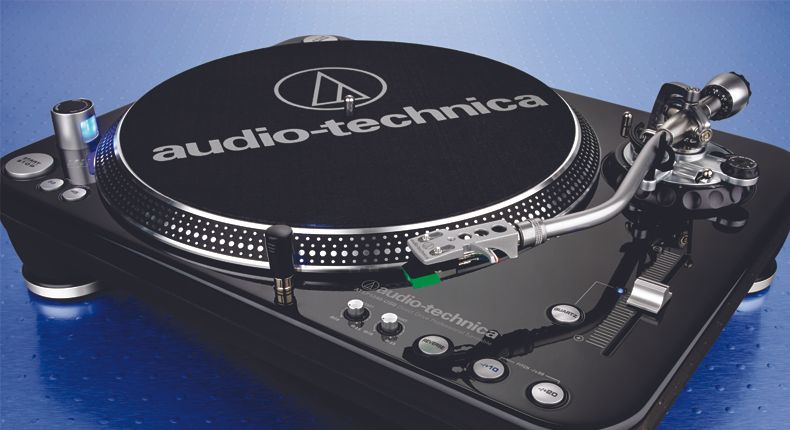Turntables are in and out of fashion. Many start off strong, but as time goes on, they deteriorate into mediocrity. Others, on the other hand, seem to persevere, and perhaps this is a measure of their greatness? Linn’s Sondek LP12, Technics’ SL-1200, SME’s Model 30, Garrard’s 301/401, Rega’s Planar 3 and, of course, Michell’s iconic GyroDec all fall within this category. By extension, I’d include the Orbe, the latter’s bigger, younger, and better brother.
The Michell Orbe has always been superior to the product on which it is based, but it is also significantly less well-known. The Gyro’s stunning sci-fi style and the visual attractiveness of the whirling gold-plated brass weights dangling underneath the platter are missing. That 60mm block of black carbon-loaded acrylic has taken its place; you wouldn’t call it attractive, but it’s the single most crucial aspect in taking the sound from outstanding (Gyro) to superlative (Orbe). If you have a GyroDec nearby, you can hear the difference for yourself by swapping the platters and listening. The Orbe suddenly seems a little less solid, a little more speed-unstable, and tonally brighter and edgier.
The Gyro is dramatically affected by the larger 5kg plate. It’s more than you’d anticipate, and it’s a good improvement if you want to get rid of the beautiful, famous spinning weights. But the Orbe doesn’t end there; the 8kg sandblasted aluminium chassis is covered with a black, sticky damping compound; this is another alteration that can be done on the Gyro for a small charge (and it’s well worth it), but it appears to have a cumulative impact on the Orbe. Finally, the deck’s subchassis is supported by a bottom plinth – or, in the case of the Spyder Edition (which lacks an acrylic foundation), a skeletal base for the Orbe’s chassis.
The key alterations are these three modifications: base, chassis, and platter. The Orbe will also receive an enhanced GyroDec motor with built-in tacho feedback speed detection, a bigger casing, and an Orbe Controller NC motor power supply. The Orbe was once characterized by the fact that its engine was not installed on the base, but this practice has long since ended, bringing the Gyro only a little closer in terms of performance. Finally, the Orbe features a superior clamping system with a unique spindle that effectively bullies the record into submission!
Other features have been kept, such as the original three-point suspension, which is innovative but fiddly to get operating properly. Many owners don’t know how to properly maintain it, resulting in the turntable sounding dull and laboured, which is something it should never do. Start with the Orbe (or Gyro) on a completely flat surface, and avoid using the suspension’s built-in height adjusters. Another suggestion is to take the spring covers off (which resonate slightly, sullying the sound). Finally, if you don’t have the SE version, remove the massive acrylic dustcover; it degrades the sound! The suspension should bounce at 2-3Hz, uniformly up and down, if left alone with a properly clothed arm lead. The bearing is a regular, excellent GyroDec inverted oil-pumping bearing that works well with Redline Ester Synthetic 5-30W engine oil, in my experience. The finish is outstanding, even more than you’d anticipate at this highish price, as any Michell lover knows.
I have yet to hear many turntables that sound better than the Orbe, regardless of price. Abbey Road Studios reportedly purchased three of these £2,000 decks for quality control work within months of its release in 1994 – and it’s easy to see why. It’s a really unobtrusive turntable that doesn’t take attention to itself, but it’s also not one of those thin-sounding, forensic, finicky decks that spews loads of detail. The Orbe, on the other hand, has a nice, relaxing, slightly warm tone. It’s not a warm, rich bloom; instead, it’s more on the sweet side of neutral, which works well with the two tonearms it’s most commonly used with: the Rega RB300 (and derivatives) and the SME Series V. (and derivatives).
You get that distinctive Michell cathedral-like soundstage (it’s wonderfully broad, exactly like open reel), and the tonal balance is seamless and smooth, with extended bass and a spacious, airy treble on a well-set-up Orbe with a decent tonearm. It’s neutral and controlled once more, with a no-nonsense vibe. The Orbe, unlike its cruder sounding sister, doesn’t impose its personality on the proceedings. The music has a natural and delightful rhythmic flow, and the dynamics are strong, sinking back into the inky darkness that only high-end vinyl can achieve.
The deck isn’t flawless, of course. The deep bass has a small looseness to it; it doesn’t stop and start like a flashing LED like the greatest direct drive decks or even the Roksan Xerxes, but it’s still tighter than the Linn. From left to right, it’s one of the largest and most expansive sounding decks you’ll ever hear, with beautifully proportioned imaging. Even if it’s quite decent by GyroDec or LP12 standards, the Orbe doesn’t hang music as far back as, say, a SME Model 10.
What I like best about the Orbe is how good it is for the price. I frequently see across £10,000 turntables that aren’t significantly better than the Orbe. It’s on par with every £5,000 deck I’ve heard, but it’s a fraction of the price. It’s the same argument you could make about the Gyro; one has to ask why Michell hasn’t raised its cost in decades. Overall, this is a fantastic ‘cheap high end’ turntable; pair it with a solid arm and cartridge, and you’ll be hard-pressed to find a finer way to listen to vinyl. What’s not to like about something that’s beautiful, trustworthy, affordable, and has great sound for the price?







